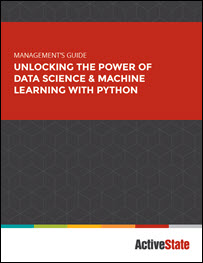
The programming language Python is being used to unlock the power of data science and machine learning.
In recent years, the amount of data available to companies has skyrocketed. According to IBM, 2.5 billion gigabytes (GB) of data are created every day. With this massive influx comes new opportunities for companies to deliver greater customer experiences and get an edge on their competition.
Data science and machine learning have emerged as the keys to unlocking business value in big data. Unlike traditional business analytics, which focus on known values and past performance, data science aims to identify hidden patterns in order to drive new innovations.
Behind these efforts and more are the programming languages used by data science teams to clean up and prepare data, write and test algorithms, build statistical models, and translate into consumable applications or visualizations. In this regard, Python stands out as the language best suited for all areas of the data science and machine learning framework.
Designed as a flexible general purpose language, Python is widely used by programmers and easily learnt by statisticians. This guide provides a summary of Python’s attributes in each of these areas, as well as considerations for implementing Python to drive new insights and innovation from big data.
All information that you supply is protected by our privacy policy. By submitting your information you agree to our Terms of Use.
* All fields required.




